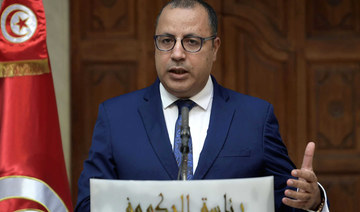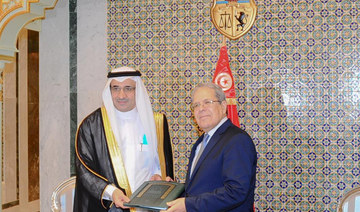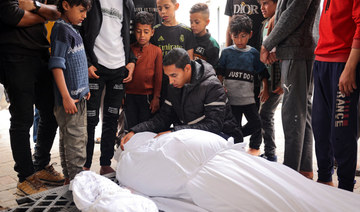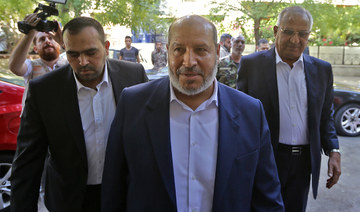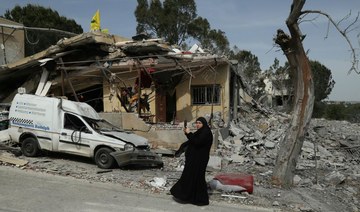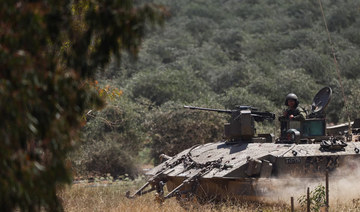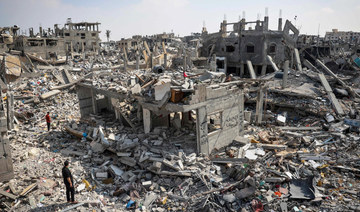NEW YORK: As Tunisia assumes the presidency of the UN Security Council for the month of January, the timing could not be more apt. It comes as the North African nation celebrates the 10th anniversary of “the revolution of freedom and dignity,” in the words of Tarek Ladeb, the country’s permanent representative to the organization.
“The (Tunisian) Revolution laid the foundation for democracy, and added impetus to Tunis’s role on the international scene as an active advocate of the UN charter, with its chief principles of multilateralism and human rights,” he said on Monday as he outlined the council’s program for the month.
This month marks the fourth time Tunisia has assumed the presidency, which is held by members of the Security Council for a month at a time on a rotating basis. Ladeb vowed that the role would be carried out with “devotion (to) unity and consensus (and) a steadfast engagement of multilateralism.” In the same vein, he said he would work “to uphold the credibility of the Security Council, by enhancing its responsibility in the resolution and prevention of conflicts.”
The envoy lamented the “erosion of the council’s credibility, which was tarnished during the (past few) years due to a lack of implementation, and the ongoing violation, of its decisions.”
He added that he intends to redouble the efforts to fully implement Security Council Resolution 2532, which was adopted in July in support of a call by UN Secretary-General Antonio Guterres in March for a global ceasefire during the COVID-19 pandemic.
Not only is terrorism contributing to the escalation of conflicts and organized crime in many countries, said Ladeb, who also serves as chairman of the Security Council’s Counterterrorism Committee, but the world is facing new threats to peace and security. He warned, for example, that threats related to the pandemic, cyberattacks and climate change represent “multipliers of violence and danger in many regions.”
One of Tunisia’s main aims during its presidency will be to push for enhanced cooperation between the Security Council and regional and subregional organizations, such as the Arab League, he said.
In the Middle East, Syria will continue to be a key consideration for the council, with a particular focus this month on the use of chemical weapons, in addition to a meeting to discuss the political and humanitarian situations.
There will also be the latest monthly session on developments in Yemen, and a quarterly debate on the wider situation in the Middle East, including the Palestinian issue.
Ladeb said that Libya is also high on Tunisia’s agenda for the Security Council. He added that he hopes to capitalize on the “positive” outcomes of the first Libyan Political Dialogue Forum, which took place in Tunis in November, by establishing a mechanism to monitor the ceasefire in the country.
“Nominating a new (UN) special envoy for Libya is crucial now to sustain the political momentum and give a push to the political process and the settlement of the crisis,” said Ladeb.
“I think the secretary-general is thinking of suggesting a new name to replace (that of former UN Middle East envoy Nickolay) Mladenov, who couldn’t take (up the offer of) this position (as Libyan envoy) due to personal and family reasons, and the council will adopt it as soon as possible.
“Libya is (Tunisia’s) neighbor. We have a steadfast and principled position toward this crisis.”
Ladeb said the Palestinian cause, “which has been dealt heavy blows in 2020,” remains a top priority for Tunis, not only at the UN but in every forum around the world.
He vowed to create “momentum for the resumption of the peace process within the framework of international concerted efforts, mainly by the Middle East Quartet (the UN, the US, the EU and Russia) and the Security Council, paving the way for negotiations on internationally agreed terms of reference for peace.”
He reiterated that those terms must include the creation of a viable, contiguous Palestinian state and the right of return for Palestinian refugees.
Iran is another issue that has been a constant on the Security Council’s agenda, especially in the five years since the adoption of the Joint Comprehensive Plan of Action (JCPOA) in 2015. More commonly known as the Iran nuclear deal, it included an agreement by Tehran to limit its nuclear research in exchange for relief from international sanctions.
It was signed by the five permanent members of the Security Council (China, France, Russia, the UK and the US), plus Germany and the EU. President Donald trump withdrew from the agreement in 2018 and reimposed US sanctions against Tehran.
President-elect Joe Biden has promised a return by Washington to the JCPOA but hinted that negotiations will be required first to address Iran’s missiles program and its disruptive regional activities. The European signatories to the deal have also hinted as much.
Although the JCPOA is not scheduled to be part of the Security Council’s agenda for January, Ladeb said: “(The deal) has been a major diplomatic achievement that should be constantly supported and preserved. This agreement remains the best available vehicle for the imperative of achieving non-proliferation and ensuring stability in the region.
“A more constructive approach is needed in the coming weeks, through engagement in reviving the agreement in order to diffuse tensions and dispel this atmosphere of distrust in a way that helps in restoring cooperation.”
Timing is apt as Tunisia takes over presidency of UN Security Council
https://arab.news/vahth
Timing is apt as Tunisia takes over presidency of UN Security Council
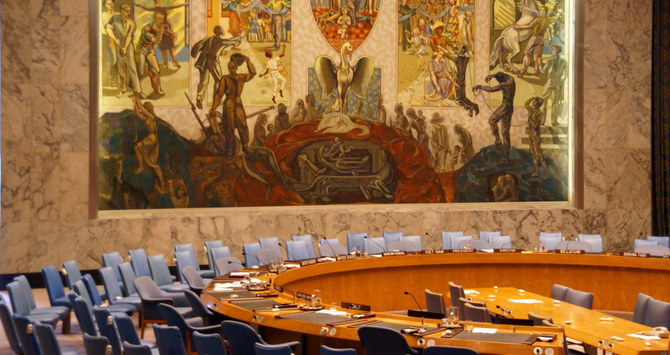
- Nation’s fourth month-long stint heading the body includes packed agenda featuring several key Middle Eastern issues
- The situations in Libya, Syria and Yemen will be addressed, along with the Palestinian issue
Hamas official says delegation to respond to Gaza truce plan in Egypt Monday
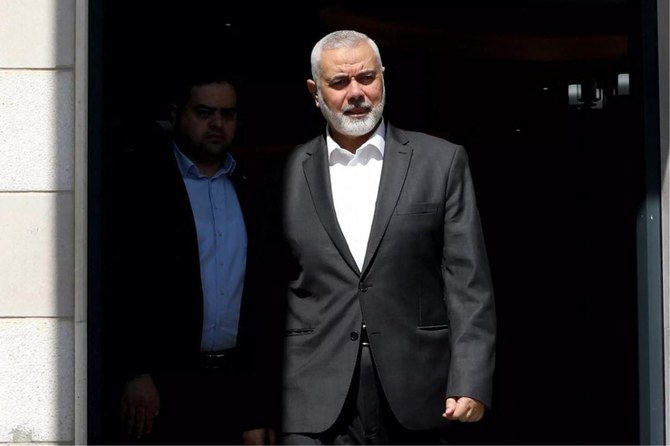
- There is growing international pressure for Hamas and Israel to reach a ceasefire deal and avert an Israeli attack on Rafah
- Hamas delegation to visit Cairo on Monday for ceasefire talks
TEL AVIV: A senior Hamas official on Sunday said that the group would deliver its response to Israel’s latest counterproposal for a Gaza ceasefire on Monday in Egypt.
“A Hamas delegation headed by Khalil Al-Hayya will arrive in Egypt tomorrow... and deliver the movement’s response” to the Israeli proposal during a meeting with Egyptian intelligence officials, said the official who declined to be named told AFP.
Mediator Egypt had sent its own delegation to Israel this week to jump-start stalled negotiations even as fighting in the Gaza Strip rages.
Egypt, Qatar and the United States have been unsuccessfully trying to broker a new Gaza truce deal ever since a one-week halt to the fighting in November saw 80 Israeli hostages exchanged for 240 Palestinians held in Israeli prisons.
Earlier, a senior Qatari official has urged both Israel and Hamas to show “more commitment and more seriousness” in ceasefire negotiations in interviews with Israeli media, as pressure builds on both sides to move toward a deal that would set Israeli hostages free and bring potential respite in the nearly 7-month-long war in Gaza.
The interviews with the liberal daily Haaretz and the Israeli public broadcaster Kan were published and aired Saturday evening. They came as Israel still promises to invade Gaza’s southernmost city of Rafah despite global concern for hundreds of thousands of Palestinians sheltering there and as the sides are exchanging proposals surrounding a ceasefire deal.
Qatar, which hosts Hamas headquarters in Doha, has been a key intermediary throughout the Israel-Hamas war. Along with the US and Egypt, Qatar was instrumental in helping negotiate a brief halt to the fighting in November that led to the release of dozens of hostages.
The sides have held numerous rounds of negotiations since, none of which produced an additional truce. In a sign of its frustration, Qatar last week said it was reassessing its role as mediator.
In the interviews, Qatar’s Foreign Ministry spokesperson Majed Al-Ansari expressed disappointment in both Hamas and Israel, saying each side has made its decisions based on political interests and not with the good of civilians in mind.
“We were hoping to see more commitment and more seriousness on both sides,” he told Haaretz.
He did not reveal details of the current state of the talks, other than to say they have “effectively stopped,” with “both sides entrenched in their positions.”
“If there is a renewed sense of commitment on both sides, I’m sure we can reach a deal,” he said.
The Israeli journalists conducted the interviews in Qatar, which has no formal diplomatic ties with Israel.
Relations between Qatar and Israel have been strained throughout the war, as some politicians in Israel, including Prime Minister Benjamin Netanyahu, have criticized Qatar for not putting enough pressure on Hamas.
Israeli legislators have also cleared the way for the country to expel Al Jazeera, the Qatar-owned broadcaster.
Al-Ansari’s remarks came after an Egyptian delegation had discussed with Israeli officials a “new vision” for a prolonged ceasefire in Gaza, according to an Egyptian official, who spoke on condition of anonymity to freely discuss the developments.
Hamas meanwhile said Saturday it was reviewing a new Israeli proposal for a ceasefire, which came in response to a Hamas proposal from two weeks ago.
Negotiations earlier this month centered on a six-week ceasefire proposal and the release of 40 civilian and sick hostages held by Hamas in exchange for freeing hundreds of Palestinian prisoners in Israeli jails.
There is growing international pressure for Hamas and Israel to reach a ceasefire deal and avert an Israeli attack on Rafah.
A letter penned by US President Joe Biden along with 17 other world leaders urged Hamas to release the hostages immediately.
Hamas in recent days has released new videos of three hostages it holds, which appear to be meant to push Israel to make concessions.
Israel meanwhile has massed dozens of tanks and armored vehicles ahead of an expected offensive in Rafah, where more than half of Gaza’s 2.3 million population is seeking shelter. The planned incursion has raised global alarm because of concerns over potential harm to civilians. The troop buildup may also be a pressure tactic on Hamas in the truce talks.
Israel sees Rafah as Hamas’ last major stronghold and has vowed to attack the militant group there in its bid to destroy its military and governing capabilities.
The war was sparked with Hamas’ attack on Oct. 7 into southern Israel, which killed 1,200 people, mostly civilians, according to Israeli authorities, who say another 250 people were taken hostage. Hamas and other groups are holding about 130 people, including the remains of about 30, Israeli authorities say.
Israel’s retaliatory assault on Hamas has killed more than 34,000 people, most of them women and children, according to health authorities in Gaza, who do not distinguish between civilians and combatants in their tally. The Israeli military says it has killed at least 12,000 militants, without providing evidence to back the claim.
France to make proposals in Lebanon to prevent war between Hezbollah and Israel
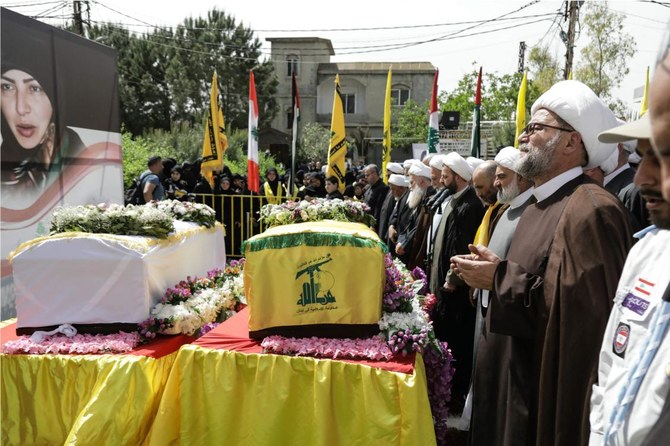
NAQOURA: France’s foreign minister said that he would make proposals to Lebanese officials on Sunday aimed at easing tensions between Hezbollah and Israel and preventing a war breaking out.
“If I look at the situation today if there was not a war in Gaza, we could be talking about a war in southern Lebanon given the number of strikes and the impact on the area,” Stephane Sejourne said after visiting the United Nations peace keeping force in Naqoura, southern Lebanon.
“I will pass messages and make proposals to the authorities here to stabilize this zone and avoid a war.”
France’s foreign minister looks to prevent Israel-Hezbollah conflict escalation in Lebanon visit
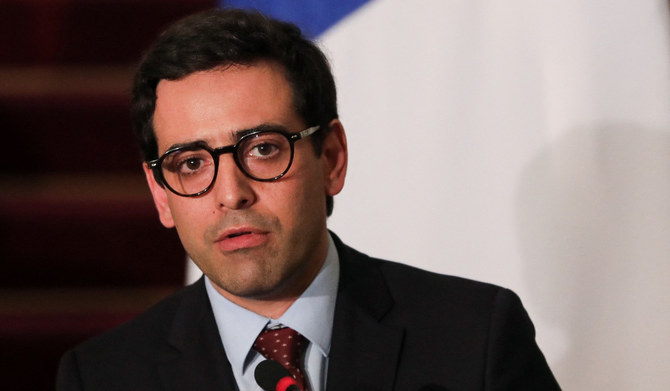
- Israel has killed more than 34,000 Palestinians, according to Gaza’s Health Ministry
- Israel has remained cautious on the French initiative, although Israeli and French officials say Israel supports efforts to defuse the cross-border tensions
BEIRUT: France’s foreign minister will push proposals to prevent further escalation and a potential war between Israel and Iran-backed Hezbollah during a visit to Lebanon on Sunday as Paris seeks to refine a roadmap that both sides could accept to ease tensions.
France has historical ties with Lebanon and earlier this year Stephane Sejourne delivered an initiative that proposed Hezbollah’s elite unit pull back 10 km (6 miles) from the Israeli border, while Israel would halt strikes in southern Lebanon.
The two have exchanged tit for tat strikes in recent months, but the exchanges have increased since Iran launched a barrage of missiles on Israel in response to a suspected Israeli attack on the Iranian embassy in the Syrian capital Damascus that killed members of Iran’s Revolutionary Guards Corps’ overseas Quds Force.
France’s proposal, which has been discussed with partners, notably the United States, has not moved forward, but Paris wants to keep momentum in talks and underscore to Lebanese officials that Israeli threats of a military operation in southern Lebanon should be taken seriously.
Hezbollah has maintained it will not enter any concrete discussion until there is a ceasefire in Gaza, where the war between Israel and Islamist militant group Hamas has entered its sixth month.
Israel has also said it wants to ensure calm is restored on its northern border so that thousands of displaced Israelis can return to the area without fear of rocket attacks from across the border.
“The objective is to prevent a regional conflagration and avoid that the situation deteriorates even more on the border between Israel and Lebanon,” foreign ministry deputy spokesperson Christophe Lemoine said at a news conference.
Lebanese Prime Minister Najib Nikati and Lebanese army chief Joseph Aoun met French President Emmanuel Macron earlier this month, where they discussed the French proposal.
In a letter addressed to the French embassy in Beirut in March, Lebanon’s foreign ministry said Beirut believed the French initiative would be a significant step toward peace and security in Lebanon and the broader region.
Local Lebanese media had reported the government had provided feedback to the French on the proposal.
French officials say the responses so far have been general and lack consensus among the Lebanese. While they deem it too early for any form of accord, they believe it is vital to engage now so that when the moment comes both sides are ready.
Paris will also underline the urgency of breaking the political deadlock in the country. Lebanon has neither a head of state nor a fully empowered cabinet since Michel Aoun’s term as president ended in October 2022.
Israel has remained cautious on the French initiative, although Israeli and French officials say Israel supports efforts to defuse the cross-border tensions.
“The flames will flicker and tensions will continue,” said a Lebanese diplomat. “We are in a situation of strategic ambiguity on both sides.”
France has 700 troops based in southern Lebanon as part of the 10,000-strong United Nations peacekeeping force.
Officials say the UN troops are unable to carry out their mandate and part of France’s proposals are aimed at beefing up the mission by strengthening the Lebanese army.
After Lebanon, Sejourne will head to Saudi Arabia before traveling to Israel.
Arab and Western foreign ministers, including US Secretary of State Antony Blinken, will hold informal talks on the sidelines of a World Economic Forum event in Riyadh to discuss the Gaza war with Palestinian President Mahmoud Abbas.
32 more killed in Gaza as Hamas studies new Israeli truce proposal
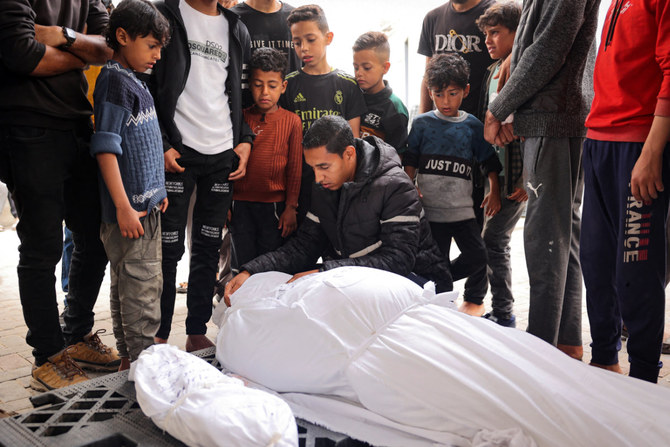
- Mediators working on compromise that will answer most of main demands
- Minister says Israel a deal could lead to suspension of planned Rafah offensive
JEDDAH/GAZA STRIP: Palestinians in Rafah said on Saturday they were living in “constant terror” as Israel vows to push ahead with its planned assault on the south Gaza city flooded with displaced civilians.
The Israeli military has massed dozens of tanks and armored vehicles in southern Israel close to Rafah and hit locations in the city in near-daily airstrikes.
“We live in constant terror and fear of repeated displacement and invasion,” said Nidaa Safi, 30, who fled Israeli strikes in the north and came to Rafah with her husband and children.
Gaza’s Health Ministry said at least 34,388 people have been killed in the besieged territory during more than six months of war between Israel and Hamas militants.
The tally includes at least 32 deaths in the past 24 hours, a ministry statement said, adding that 77,437 people have been wounded in the Gaza Strip since the war broke out when Hamas militants attacked Israel on Oct. 7.
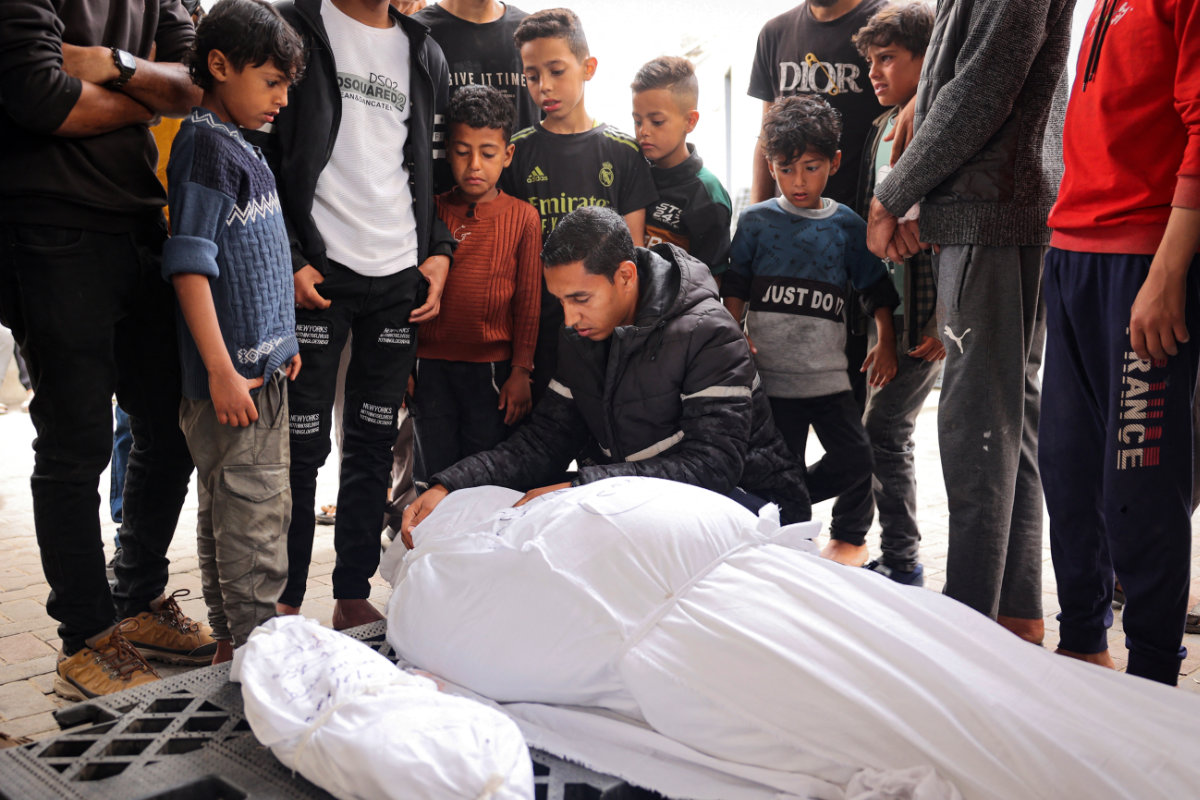
Early Saturday, an airstrike hit a house in Rafah’s Tel Sultan neighborhood, killing a man, his wife and their sons, ages 12, 10 and 8, according to records of the Abu Yousef Al-Najjar hospital’s morgue. A neighbor’s 4-month-old girl was also killed.
Ahmed Omar rushed with other neighbors after the 1:30 a.m. strike to look for survivors, but said they only found bodies and body parts. “It’s a tragedy,” he said.
An Israeli airstrike later Saturday on a building in Rafah killed seven people, including six members of the Ashour family, according to the morgue.
Five people were killed in the Nuseirat refugee camp in central Gaza overnight when an Israeli strike hit a house, according to officials at the Al-Aqsa Martyrs Hospital.
Elsewhere, Israeli forces shot and killed two Palestinian men at a checkpoint in the Israeli-occupied West Bank, the military said. It said the men had opened fire at troops stationed at Salem checkpoint near the city of Jenin.
Violence in the West Bank has flared since the war. The Ramallah-based Health Ministry says 491 Palestinians have been killed by Israeli fire.
Israel's counterproposal
Hamas said it was studying Israel’s latest counterproposal for a ceasefire, a day after reports said a delegation from mediator Egypt was in Israel trying to jump-start stalled negotiations.
Israel’s foreign minister said that the Rafah incursion could be suspended should there be a deal to secure the release of Israeli hostages.

“The release of the hostages is the top priority for us,” said Israel Katz. “If there will be a deal, we will suspend the operation.”
The Egyptian delegation discussed a “new vision” for a prolonged ceasefire in Gaza, according to an Egyptian official, who spoke on condition of anonymity to freely discuss the developments.
It wasn’t immediately clear whether Israel’s proposal was directly related to the visit.
Khalil Al-Hayya, deputy head of Hamas’s political arm in Gaza, said it had “received the official Zionist occupation response to the movement’s position, which was delivered to the Egyptian and Qatari mediators on April 13.”
Negotiations earlier this month centered on a six-week ceasefire proposal and the release of 40 civilian and sick hostages in exchange for freeing hundreds of Palestinian prisoners in Israeli jails.
A separate Hamas statement said leaders from the three main militant groups active in Gaza discussed attempts to end the war. It didn’t mention the Israeli proposal.
The armed wing of Hamas also released video footage of two men held hostage in Gaza, identified by Israeli campaign group the Hostages and Missing Families Forum as Keith Siegel and Omri Miran.
Mediators are working on a compromise that will answer most of both parties’ main demands, which could pave the way to continued negotiations with the goal of a deal to end the war, the official said.
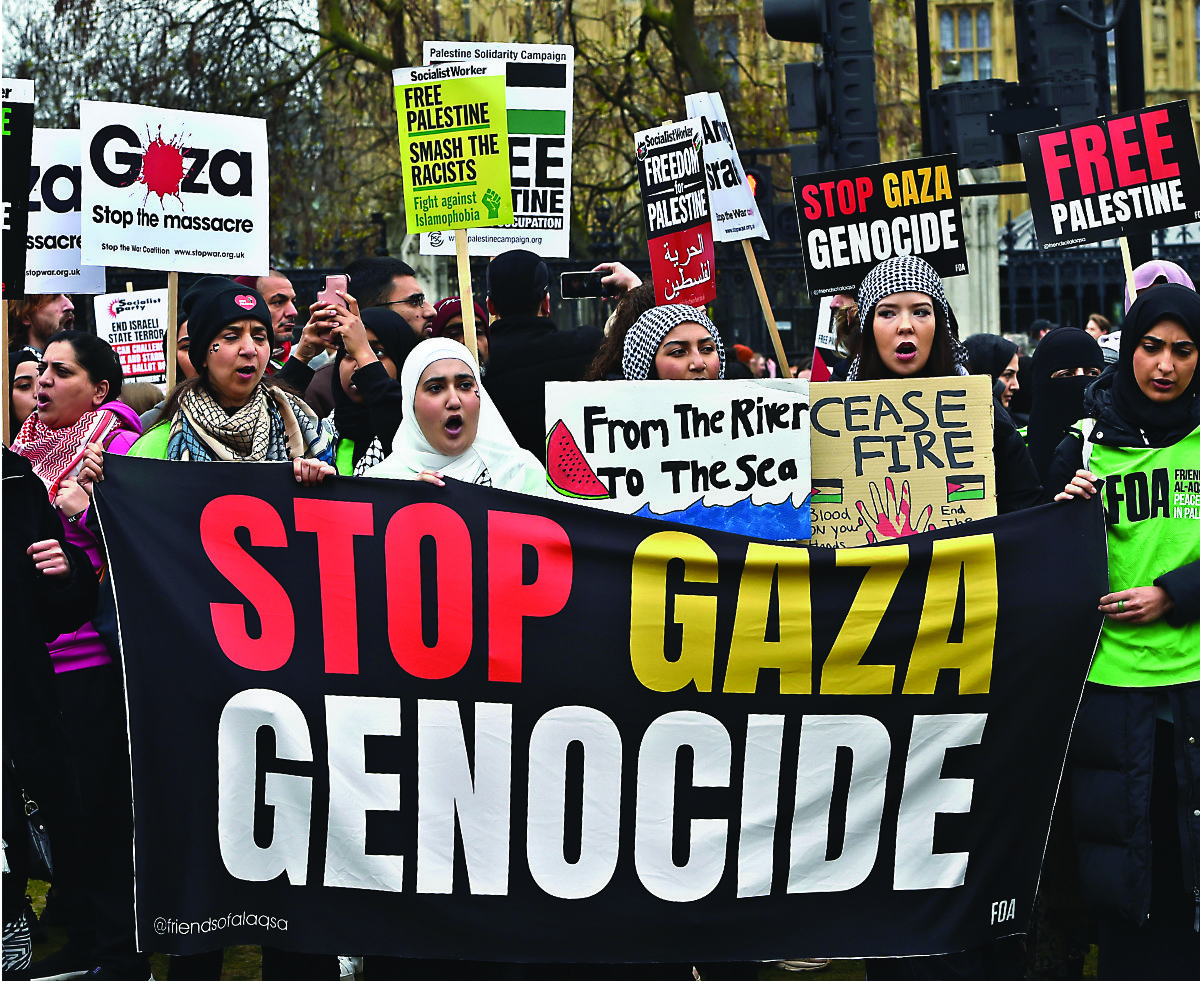
Hamas has said it won’t back down from demands for a permanent ceasefire and full withdrawal of Israeli troops.
Israel has rejected both and said it will continue military operations until Hamas is defeated and that it will retain a security presence in Gaza.
There is growing international pressure for Hamas and Israel to reach a ceasefire deal and avert an Israeli attack on Rafah, where more than half of Gaza’s 2.3 million people have sought refuge.
Israel has insisted for months it plans a ground offensive into Rafah, on the border with Egypt, where it says many remaining Hamas militants remain, despite calls for restraint including from Israel’s staunchest ally, the United States.
Egypt has cautioned an offensive into Rafah could have “catastrophic consequences” on the humanitarian situation in Gaza, where famine is feared, and on regional peace and security.
Tolerating Israeli abuses
Washington has been critical of Israeli policies in the West Bank. US Secretary of State Antony Blinken, who is expected in Israel on Tuesday, recently determined an army unit committed rights abuses there before the war in Gaza.
But Blinken said in an undated letter to US House Speaker Mike Johnson, obtained by The Associated Press on Friday, that he’s postponing a decision on blocking aid to the unit to give Israel more time to right the wrongdoing. Blinken stressed that overall US military support for Israel’s defense wouldn’t be affected.
The US has also been building a pier to deliver aid to Gaza through a new port. Israel’s military confirmed Saturday that it would be operational by early May.
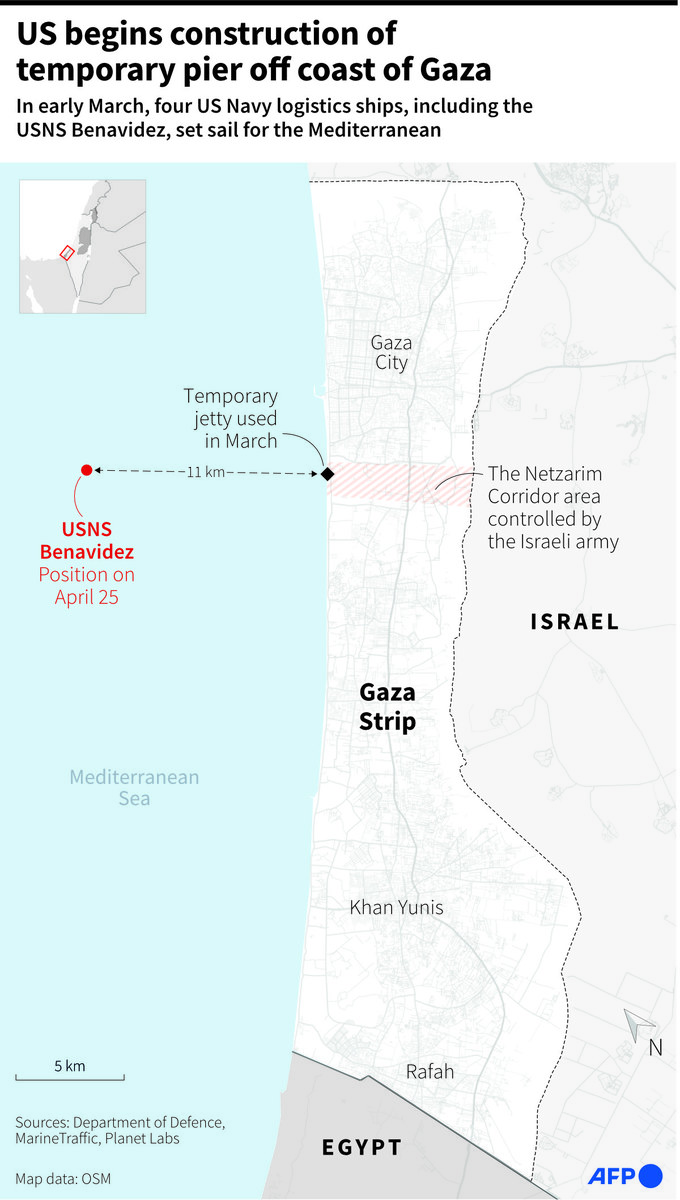
The BBC reported the UK government was considering deploying troops to drive the trucks to carry the aid to shore, citing unidentified government sources. British officials declined to comment.
Another aid effort, a three-ship flotilla coming from Turkiye, was prevented from sailing, organizers said.
Student protests over the war and its effect on Palestinians are growing on college campuses in the US, while demonstrations continue in many countries.
Hamas sparked the war by attacking southern Israel on Oct. 7, with militants killing around 1,200 people, mostly civilians, and taking around 250 hostage. Israel says the militants still hold around 100 hostages and the remains of more than 30 others.
Sudan demands emergency UN meeting on UAE ‘aggression’
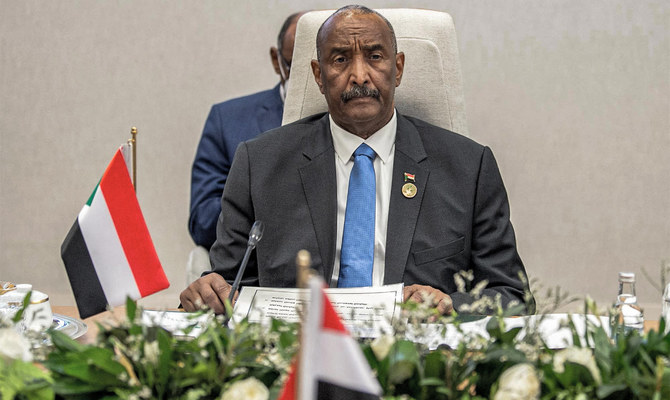
- For months the regular army has accused the United Arab Emirates of supporting the RSF, a charge the UAE denies
PORT SUDAN, Sudan: Sudan has requested an emergency UN Security Council meeting on what it calls UAE “aggression” for allegedly supporting paramilitaries battling the army, a diplomatic source said Saturday.
The fighting broke out in April last year between the regular army, headed by Sudan’s de facto leader Abdel Fattah Al-Burhan, and the paramilitary Rapid Support Forces (RSF) led by his former deputy Mohamed Hamdan Dagalo.
For months the regular army has accused the United Arab Emirates of supporting the RSF, a charge the UAE denies.
“Yesterday, our permanent representative to the United Nations submitted a request for an urgent session of the Security Council to discuss the UAE’s aggression against the Sudanese people, and the provision of weapons and equipment to the terrorist militia,” the source told AFP.
The country’s official SUNA news agency confirmed that Sudan’s UN representative, Al-Harith Idriss, had submitted the request.
SUNA cited Idriss as saying this was “in response to the UAE representative’s memorandum to the Council,” and that “the UAE’s support for the criminal Rapid Support militia that waged war on the state makes the UAE an accomplice in all its crimes.”
In a letter to the Security Council last week, the UAE foreign ministry rejected Sudan’s accusations that it backs the RSF.
The letter said the allegations were “spurious (and) unfounded, and lack any credible evidence to support them.”
Separately on Saturday, the UN Security Council expressed “deep concern” over escalating fighting in Sudan’s North Darfur region and warned against the possibility of an imminent offensive by the RSF and allied militias on El Fasher.
The city is the last Darfur state capital not under RSF control and hosts a large number of refugees.
United Nations officials put out similar warnings Friday, with the UN’s High Commissioner for Human Rights Volker Turk expressing his “grave concern.”
Secretary-General Antonio Guterres’ spokesperson’s office said an attack on El Fasher “would have devastating consequences for the civilian population... in an area already on the brink of famine.”
The Sudan war has killed tens of thousands of people and forced more than 8.5 million people to flee their homes in what the United Nations has called the “largest displacement crisis in the world.”
In December, Khartoum demanded that 15 Emirati diplomats leave the country after an army commander accused Abu Dhabi of supporting the RSF, and protests in Port Sudan demanded the expulsion of the UAE ambassador.
The Wall Street Journal, citing Ugandan officials, reported last August that weapons had been found in a UAE cargo plane transporting humanitarian aid to Sudanese refugees in Chad, prompting a denial from Abu Dhabi.



